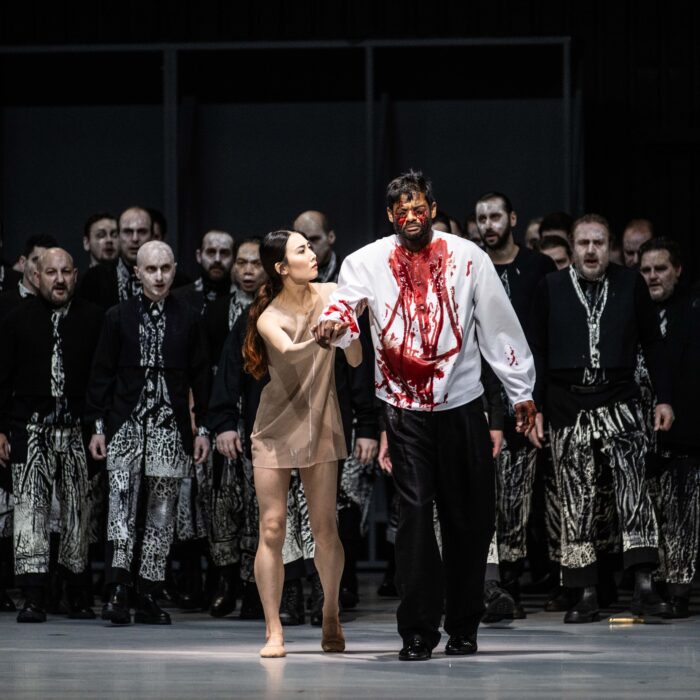
Rossini Opera Festival 2022 Review: Otello
Cucchi’s Imaginative & Forceful Production Will Live In Our Memories
By Alan Neilson(Photo: ROF/Amati Bacciardi)
Without memories we are nothing but an empty shell. They define our sense of self. It is only through memory that we can make any sense of what is around us. It allows us to rationalize and contextualize tragic events, to enjoy the present, and to project the consequence of our actions into the future.
Yet, memory itself is often unreliable, constructed through interpretation, which is subject to the emotions experienced at the time of the event, as well as after the fact. While memories can recall objective reality in a crude fashion, the connections we build between memories allied to our wildly changing emotions ensure that interpretations, and therefore memory itself, is in a constant state of flux, and in extreme cases may even lead to the development of memories which are objectively false.
It is completely normal, therefore, for two people who witness the same event to have different memories of it, and also for people to view and understand the present in different ways.
A Drama Presented Through The Prism Of Memory
For this summer’s Rossini Opera Festival production of “Otello,” the director Rosetta Cucchi used the prism of memory to present a reading in which the mental and physical abuse of women by men was its central theme. A dangerous decision, given that it could easily come across as preaching. This, however, was not the case at all. What in fact materialized was a highly dramatic presentation seen mainly from the perspective of Desdemona’s devoted confidante Emilia, but in which the memories of Desdemona are also interpolated.
Emilia has no doubt suffered all sorts of abuse at Iago’s hands, an example of which is presented on stage when he brutally rough-handles her. The lead up to, and traumatic slaughter of, Desdemona within the context of her own experience, therefore, provided Emilia with a unique set of memories of the event, which may or may not correspond to other people’s recollections, and which may even include events which are objectively untrue. This matters not, as for Emilia, this is her understanding of reality. Likewise the same is true for Desdemona. Cucchi’s reading, therefore, takes the imaginative step of presenting the drama from their unique perspectives, in which for both of them male violence is a dominant element.
It was also a reading which grew naturally from Di Salsa’s text, and supported by Rossini’s music, unsurprisingly so, given that male violence does actually drive the narrative. Nor did Cucchi promote the issue at the expense of other important themes, for example her handling of Otello’s social position was clearly highlighted: lauded by all on his arrival back in Venice after having defeated the Ottoman Turks, he is then completely ignored at a banquet in his honor, as he is left to sit alone in the crowd.
Most importantly, it was a presentation which worked. It had an excellent momentum and a gripping intensity, in which the drama played out coherently.
During the overture, the curtain rises on a dark scene in which Emilia appears to be in a state of mourning, and is greeting acquaintances, including Iago, from whom she retreats in fear. Images of newspaper reports of a woman’s murder and then the murder itself are projected onto the background of the stage. As the overture concludes, Emilia then took her place in a raised area at the back, right hand side of the stage, and watched the drama unfold, or rather her memories of the events unfold.
Time and again, Desdemona is physically and mentally, directly and indirectly, abused by the men around her, finally culminating in her murder by Otello, the man she loves. Even her father Elmiro is controlling and physically violent towards her. The pain suffered is reinforced by her memories of childhood which are projected onto screens on the stage, in which she recalls her father pulling her out of a ballet class, and then later by her memories of her teenage friend Isaura, murdered by her lover, portrayed by a dancer on a platform at the back of the stage
At the end of Act two, Cucchi cleverly expands the theme from Desdemona in particular to women in general: in a delirious state, having just received a beating from Otello, Desdemona is joined by a women’s chorus who stand defiantly in a line across the stage, their clothes covered in blood, each with a hand outstretched towards the audience, on which is written “NO.”
The sets, designed by Tiziano Santi, were nicely balanced, with the two outer acts set in darkly lit luxurious rooms of a palazzo, while the central act took place in the more brightly lit servants’ area. It was a good call by Santi and lighting designer Daniele Naldi; too often, designers are prone to rely on unremitting darkness, with little or no contrast, to create the background for a tragedy. Rarely does it work!
The costumes, designed by Ursula Patzak, were from the early to mid 20th century, and were unobtrusive and perfectly suited to the staging.
The Three Tenors
On the musical side, “Otello” is unusual for having three tenors in lead roles, namely Otello, Rodrigo, and Iago, each with a distinctively different sound.
Enea Scala’s portrait of Otello as an outsider was splendidly crafted to bring out his sense of social rejection and isolation, which he convincingly combined with his character’s jealous and suspicious nature to fuel his underlying violent tendencies. His singing was passionate, powerful, and often violent. It was as if he were able to project the energy of Otello’s life force itself. His voice has an attractive warmth and depth, which he used with skill to alter the intensity of his emotions, and heighten the tensions underlying Otello’s character. Passages of recitatives in which he confronted Desdemona and Rodrigo were charged with an electric pulse which brought their exchanges thrillingly alive.
Having reviewed Antonino Siragusa on a number of occasions, and never been overly impressed, his performance as Iago came as a pleasant surprise. It is a role which seems to suit him, both vocally and as a character. Singing with a menacing calm, he oozed evil intent. Rarely far from the action, at least until he was killed, he was always around, lurking in the shadows or wheedling his way into someone’s good books. Emilia’s memories sum up his personality perfectly, as he looks down from a video screen with an intimidating laugh. He possesses a high lying tenor, which was in very good health, moving firmly and with ease into the upper register, which was secure and firmly managed.
The third tenor was Dmitry Korchak, who made an excellent impression in the role of Rodrigo. He possesses a well-supported voice with a luminous timbre, and his singing exhibited a beautiful, natural lyricism. He successfully engaged with his character, capturing the young man’s ardent feelings and impulsivity as he gave voice to his strong emotions, moving with consummate ease over the range and popping out the high notes with aplomb.
A Compelling Desdemona
Soprano Eleonora Buratto presented an intense and emotional portrait of Desdemona, in which her inner torment and strength were expertly captured. Her rendition of the “Willow Song” was beautifully developed, with her soft emission, delicate, detailed phrasing and attractive timbre, coated with grief, brilliantly revealing the depth of own suffering. Her spirited confrontations with Rodrigo, the collapsing relationship with her father Elmiro, and her exasperated pleadings with Otello enabled her to display the wonderful expressivity of her voice, which she infused with her character’s changing emotions, and which allowed her to show off her splendid technique and vocal versatility.
Many of the opera’s high-points are centered on its ensemble pieces, and with four excellent soloists in the main roles, they did not disappoint. Scala’s strong, emotional outbursts, full of passionate intensity, Siragusa’s high-lying tessitura, with the ability to hit the high notes securely and with clarity, Korchak’s vocal flexility, strength and tonal beauty, and Buratto’s scintillating versatility, expressivity and ability to push the voice high above the combined musical forces came together brilliantly in different combinations to produce some magical singing.
The Act one duet “No, non temer” was particularly successful, not necessarily for its musical quality, which was high, but for its staging. Relaxed and confident, Iago was slumped in armchair next to Rodrigo, who was overcome with grief, unable to relax, and susceptible to manipulation. Siragusa’s sweetly intoned words quickly brings comfort, while Korchak’s voice fills with hope. The two voices then combine in an uplifting finale to the piece. It was all so natural and believable, nothing was exaggerated, nothing appeared contrived. Just two friends having a chat!
A Strong Supporting Cast
Evgeny Stavinsky expertly captured the inflexibility and authoritarian nature of Desdemona’s father Elmiro. Possessing a light bass, with an attractive timbre, his singing was firm and direct. His delivery of recitatives precisely crafted to bring out his unyielding character.
Mezzo-soprano Adriana Di Paolo was cast as Emilia, which for this production became a more prominent role. She has a good stage presence and developed her character well, successfully capturing her traumatic reaction, as she reflected upon the tragic events. Her voice possesses a pleasing timbre, which she projected well, and although her singing lacked fluidity, was suitably expressive.
Tenor Julian Henao Gonzales was double parted as Lucio, one of Otello’s officers, and the Gondolier, in which he made a fine impression with his distant sweet song from the lagoon.
Tenor Antonio Garés was a suitably authoritative Doge and essayed the part successfully.
Conductor Yves Abel produced a dramatically strong reading from the Orchestra Sinfonica Nazionale Della RAI, by playing up the score’s dark textures, and accentuating its rhythmic tensions, all while ensuring the necessary contrasts by giving due attention to its lighter moments. From the opening bars of the overture, Abel infused his reading with an energy that carried the drama forward, which exploded brilliantly in the Act three storm scene. Yet, it was also a controlled, detailed reading, which captured the clarity of the melodies.
The Coro Del Teatro Ventido Basso under the chorus master Giovanni Farina sang with sensitivity, energy and precision.
Overall, this was a first class production. It was dramatically powerful, underpinned by a clearly thought out and imaginative vision of the work based upon the power and role of memory. The singers, who were excellent, brought depth and nuance to their characterizations. The orchestra produced a dramatically focused and sensitive reading.
Yet among the rapturous applause at the final curtain, one could discern one or two discontented voices. Why? It is difficult to answer that question, but some people are clearly never satisfied, or maybe the production was simply successful in highlighting the problem of male violence against women, a problem which some people do not wish to see acknowledged.



